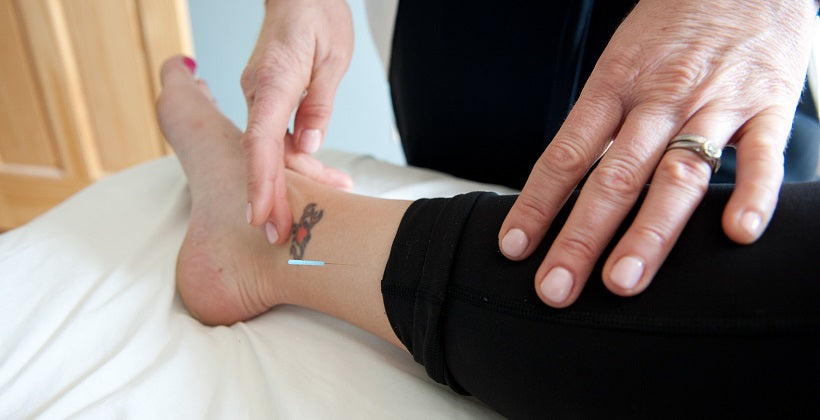While on vacation recently I wore a pair of flat, unsupportive sandals for a few days. By the end of one night, I could barely walk on my right foot, and the first steps I took when I got out of bed in the morning felt like I was walking on glass. I wrote to my doctor, who told me I was describing "classic plantar fasciitis."
What is plantar fasciitis? It refers to an inflammation in the connective tissue at the bottom of our feet known as the Plantar Fascia. There have been studies showing the effectiveness of acupuncture for heel pain due to plantar fasciitis. From a Traditional Chinese Medicine perspective, when we address plantar fasciitis, we are moving Qi and strengthening the Liver, which is in charge our fascia, tendons and ligaments. We are also strengthening the Kidneys, which are in charge of our lower legs, ankles and feet.
Since I’m an acupuncturist, I decided to needle myself (writer's note: it’s not easy to needle your own feet. I had friends and family sit nearby chatting with me to distract me).I took second opinion from an acupuncturist and would needle myself and do moxibustion two times in a day.
It felt a lot better after only one day, so I diligently kept at it while I was away. I got myself inserts for my shoes and I promised to discard the ill-fitting sandals that trapped me in this mess in the first place. place.

When I returned home, I spoke to my personal trainer Kaitlyn about exercises to alleviate plantar fasciitis. She suggested focusing on the calf and the lower extremity from the knee down to the foot: if you’re wearing flat shoes, your arches aren’t supported, which drags your heel downward, straining your calf.
Here are her suggested exercises:
- Calf stretch: Begin by facing a wall and place your hands on the wall.. Take one foot back. You want the heel to be completely down and bend your front knee. If you don’t feel the calf stretch, slightly bend the back knee. Lightly bend the back knee if the calf isn’t stretched enough. In case of pain in your Achilles tendon, slide your back leg forward for a more mild stretch.
- Shins: Put your back against the wall and move about two inches away from it. Flex your feet, activating your shins. Squeeze your shins to draw yourself to an upright position instead of squeezing your glutes. Flex your feet and recline against the wall. Again, focus on using your shins.
- Complete the alphabet with your ankle: This positions your foot back to its correct function from being in shoes that dragged your heel down.
- If you feel comfort, then roll out your calves with a foam roller. With plantar fasciitis, you fail to roll out your feet. It feels like little micro tears beneath your feet and a tennis ball or foam roller will just aggravate the condition.
I have continued to do acupuncture and moxibustion on myself. I also get massage and chiropractic regularly. If you have plantar fasciitis, consider getting one or more of these therapies. Since I’m a very big proponent of do-it-yourself care, though, here are things you can do at home to help yourself heal:
- Do the suggested exercises every day.
- Use shoe inserts specifically for plantar fasciitis.
- If you're comfortable doing so, try moxibustion at home on the sole of your foot, ankle and in the area on the lower leg below the gastrocnemius.
- Again if you're comfortable, try Gua Sha on the same areas as you do moxibustion. Alternate doing gua sha and moxibustion – you don’t have to do them both in the same day, but doing at least one will speed healing time.
Ask your acupuncturist for instructions if you are unfamiliar with moxibustion or Gua Sha. It can take time to heal from plantar fasciitis because we need to walk on our feet every day, but with these suggestions you’ll be well on your way.
Care Consideration: Just a reminder that the above information is not a substitute for medical care and is not a substitute for medical advice or recommendations from a healthcare provider. This information is not intended to treat, mitigate or cure any disease. That said, we encourage you to connect with an Acupuncturist in your community to learn more about this and other Traditional Chinese Medicine options. If you’ve got questions about Chinese herbal medicine or getting started with an Acupuncturist, feel free to connect with us on hello@mydaolabs.com.
Denise Cicuto is a Licensed Acupuncturist and Chinese herbalist, and a diplomate in Oriental Medicine with certifications in Gua Sha, Alchemical healing, and advanced training in pregnancy and postpartum care. When not doing acupuncture, Denise practices yoga, mindfulness meditation, takes photographs, and does historical reenactment. You can learn more about Denise at cicutoacupuncture.com.
















